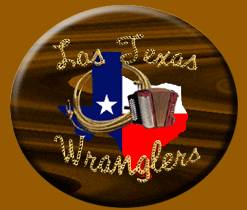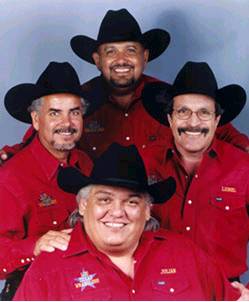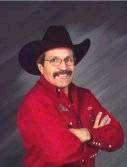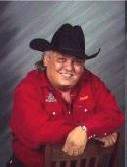 | Home
| Home
Grupo Vida | Bobby Pulido | Kumbia Kings | Solido | Siggno | Costumbre | Emilio | Jay Perez | Intocable | Stampede | Intenso | Selena Tribute | Freddy Fender | "El Flaco" Jimenez | Los Texas Wranglers
Los Texas Wranglers


 LIONEL GUERRA JR.
LIONEL GUERRA JR.
 JULIAN LIMON FERNANDEZ
JULIAN LIMON FERNANDEZ
Here's a bit of an Auto-Biography on Julian Limon Fernandez that you may find interesting.
Julian Limon Fernandez By Bertha De La Cruz, Publicist - Los Texas Wrangler
Born in Austin, Texas by way of Chicago. His parents, Juan y Aniceta, were visiting family in Austin on January 9, 1956 when Julian was born. Soon the family went back to Chicago where Julian spent his toddler years. When he was around five years old the family would frequently go to Maxwell Street’s open Flea Market where Julian and his brother Juan (Sonny) used to enjoy the sounds of the Negro bands. Without knowing these would be the pioneers of modern Chicago Blues in the likes of Paul Butterfield, Bloomfield, Nick "The Greek" Gravenites, Goldberg, Steve Miller, Corky Siegel, Jim Schwall, Muddy Waters, Otis Spann, Little Walter, James Cotton, Buddy Guy, Otis Rush, Howlin’ Wolf, Sam Lay, Bonnie Lee, Shirley Johnson, and, of course, Big Time Sarah, plus many more. Julian especially liked the way the Negro ladies sang and moved. This was a spiritual awakening for Julian and Sonny.
You see, without them knowing, they had music in their blood. Julian’s grandfather, Antonio Fernández, was a well known musician in Mexico. He would often tour throughout Mexico playing accordion with Los Montañes del Alamo. This was a very popular and unique Conjunto being that they had wooden flutes, clarinets, saxophones and brass instruments plus percussion. Sometimes they would travel with 15 musicians and sometimes with 5 musicians. Julian also had another ace in the hole; his grandfather on his mom’s side, Manuel L. Limón “Pops,” was a true inspiration to Julian’s career. Manuel was also a famous musician. He played with the likes of Perez Prado, E.R. Flores y Su Orquesta, Fred Salas y Los Latinos, The Nash Hernandez Orchestra, Sonora Royale and was one of the founders of Austin’s Mariachi Estrella. Manuel was recognized as Austin’s oldest Mariachi by the City of Austin’s Mexi-Arte Museum.
With this much talent flowing in his blood, Julian, in his teenage years wanted to expand as a musician. He had already won awards in the UIL competitions but knew he could do more. At the age of 13, Julian was asked to play in a Sonora with Henry Galarza where he started to experiment with rhythms and tempos, especially cumbias.
Soon he had the only tropical Conjunto in Austin in 1974. While a junior in high school he formed “La Costa Tropical.” It consisted of an electric organ, electric bass, electric guitar, drums and percussion, which were usually his brothers and sisters. They were the first Tropical Conjunto in Central Texas and business was great. However, he had one problem; most of his Tejano musician friends turned against him because of the music he was playing. Back then you had to play Chicano style cumbias. The true Chicano drummers didn’t know how to play tropical rhythms but the local chicas loved that moving beat. Thanks to Rigo Tovar, Renacimiento74, Los Tam Y Tex, Perla del Mar, Caribe Tropical, Aniceto Molina and a few more. Tropical was on it’s way to Texas and the whole world.
After high school Julian went into the Air Force and was asked (ordered) by the base commander to be in The Band of the Midwest at Chanute AFB in Rantoul, IL. There Julian started a combo with black, white, Puerto Rican and Hispanic musicians. They were called Los Alas de Plata (The Silver Wings). They played what is now called Latino Rock. They played in Chicago and Champaign, IL, Iowa, Michigan and Ohio. Not bad for some fly guys.
After the Air Force, Julian went back to Texas where he formed Invasion 78. He had also written several songs primarily tropical and romantico while in the Air Force and decided to experiment with them with his new group. Julian wasn’t that good at in speaking Spanish but his mother was always beside him making sure he used proper Spanish in his songs. Julian would then take the songs to “Pops” and get his opinion on them. If “Pops” heard that it needed more on the music Julian and “Pops” would stay up most of the night until Julian got it right.
After a while the conjunto was doing really well, being that they didn’t have any competition for business.
Joe Lopez Sr. of Joey Records in San Antonio had heard about Invasion 78 and the ruckus they were making in Austin. Some of the groups that Joey Records was recording were getting back to him saying that Invasion 78 had a large following. Soon, after hearing this from the grupos, Joey called Julian and setup an interview just to meet Julian. Joey was very impressed that a Chicano was into and actually had a fan base in Tropical. Of course this was rare because most of the Tropical groups were from Mexico and mainly Mexicans playing it.
Julian went on and recorded with Joey Records. The album did very well with the media release but Julian decided not to release it to the public. “It wasn’t the right time,” Julian said. People just couldn’t figure out why this was so, why Julian asked not to be released. What happened was, Austin Chicano bands and orchestras had united together to blackball Invasion 78 as well as any tropical group coming into town. Wherever Julian had a gig a Tejano group would go to the club owners and would offer to play for less. Julian was so upset, taking it personal he decided to take his music beyond Texas.
Julian still played the weddings, sweet 15s, private parties and personal events but he didn’t play any clubs in Austin. He asked Joey if he could release his album in parts of Mexico and Chicago. Joey saw where Julian was taking this and did exactly that. Invasion 78 was a big hit in Monterrey, D.F, La Tierra Caliente (Guerrero), and Cuernavaca. On top of the charts at “La Rancherita de Monterrey” and WOJO in Chicago. Austin’s Chaparral Club and Macario’s, San Antonio’s Randy’s Ballroom, Houston’s Pan American Ballroom, Waco’s Mutualista Club, Dallas’ Lujan Ballroom and Ft. Worth’s Guy and Dolls were the only Texas venues that Invasion 78 performed. They were the only ones that didn’t allow themselves to be bullied by the Chicano Bands. Soon after the smaller clubs realized they too could benefit from Invasion 78. With the help of Napoleon Colombo, José Garcia Sr., Victor “Tavo” Balderas and other local radio DJs it was time to bring Tropical into the mainstream and smaller clubs.
Nowadays there are many tropical/gruperos/romantico/norteño bands in Austin and surrounding towns. And most of them don’t even have a clue Julian opened the doors for them. The sacrifices, sabotages, negative energy and prejudices he had to endure. Julian was threatened and alienated by close friends and musicians. They wanted Julian to stop playing that “wetback” music. Julian and his Conjunto Tropical, Invasion 78, brought a diverse live music to Austin, which today is stronger than ever and is being played on all Hispanic radio stations in Austin especially on the only Tejano radio station.
Sadly, in 1983 while traveling to Houston from Dallas two of Julian’s musicians decided to ride with family members instead of traveling in the band bus. The next morning Julian was awaken by DPS troopers and told that his two musicians, along with three of their relatives had run off the highway and over a bridge; no one survived the crash. DPS said alcohol was to blame. Julian was devastated and took the news hard. The folks back home thought the bus had crashed and killed all the members. Julian called home and Napoleon, his friend at an Austin radio station, to give him the actual incident report. It was broadcast in Texas, throughout
Mexico and in Chicago. The support from fans and all the folks was overwhelming to Julian. He then decided to end Invasion 78 as a group, to honor the deceased and their families.
However, Julian had made a promise to Oklahoma City to play at a concert. Oklahoma City was honoring Invasion 78 for the contribution their music brought to the Hispanic community. In December 1984, Julian formed Invasion with new members. The reception was overwhelming to Julian and his brothers. People were waiting in line around the convention center, just to get a glimpse of Julian and his brothers. After the concert Julian, Freddy and Hector stayed to sign autographs and take pictures with the locals and students of the University of Oklahoma. Julian’s close friend and fellow musician, a Tejano Legend, Shorty Ortiz of Shorty y Los Corvettes had accompanied Julian to Oklahoma City and wouldn’t have believed it if he hadn’t seen it with his own eyes all those folks cheering and yelling for Invasion 78 as they were driving into the building at the Myriad Convention Center.
Two years later, Julian was invited by a friend Paco Rodriguez to sit in on the drums. That’s all it took to revive Julian’s soul. Music was still a big force in Julian’s life. He then was asked to play with one the Chicano bandleaders that had blackballed him in the earlier years. Julian held no remorse and went to play with the Tejano Legend, Alfonso Ramos. Alfonso really likes the excitement that Julian puts into his playing. Soon they became great friends and continue to stay in touch. Alfonso still has a big influence in Julian’s music selection. After playing for Alfonso Ramos, Julian was approached by José Maria De Leon Hernandez (Little Joe). He asked Julian to help his brother, Rocky, with his new band Milagro. Rocky had just suffered a brain aneurysm and was getting back on his feet. It too was a great experience and Julian enjoyed opening for Little Joe and sometimes sitting in with Joe. While traveling with the Milagro band Julian met a lot of new groups that were making an impact on a new Tejano scene. New groups like Emilio Navaira y su Grupo Rio, Selena y Los Dinos, Shelly Lares, La Sombra, Grupo Fama, Gary Hobbs and the Hot Sauce Band and Fandango U.S.A.
A true pioneer and legend in broadcasting, Marcelo Tafoya, invited Julian to join his radio station KRGT 92.1FM in Hutto, Texas. Julian accepted and started his new career in radio broadcasting. Julian’s show became one of the hottest on the airwaves. Julian was approached and asked to help book bands at “Dance Across Texas.” Julian, knowing most of the bands personally, accepted. Their Julian brought Emilio, Shelly, Selena, David Lee, Roberto Pulido, Alfonso Ramos with Sunny and the Sunliners, Agustin with Joe Bravo, Gary Hobbs and Fandango U.S.A. Everyone was happy because all the bands were making great money in a town that wasn’t strong for live Tejano music. After about a year, a religious outfit from California bought the radio station and all the staff lost their jobs. Then, Julian gets a call from Mr. Fatz. He said to Julian that KTXZ 1560AM was going to hire him as program director and he asked Julian to join him. Julian took him up on the offer! Things were going well until Julian was approached by several of his peers who were demanding a cut of Julian’s Dance Across Texas money. Julian asked them, “what money?” They replied, “from the gate”. Julian told them, “Hey, I’m doing this for free! I don’t get anything from Dance Across Texas but free passes that the radio station gives away.” Julian then said, “I do this for the bands because I used to be one of them and I know the struggle to make decent pay playing music. It’s that simple!” Soon after that Julian was told that he could either be a radio DJ or a booking agent, not both. Julian decided neither and he walked away from the radio station and booking at Dance Across Texas.
Julian tried hard to be a part of the work force of America, landing jobs here and there. Feeling that there was more he could do, time would pass and his life would feel meaningless. Then a friend out of the past, Roberto Cantu, who knew Julian back from the Invasion 78 days, asked him if he could help with his new conjunto. Julian told Robert that he could help while they found a full-time drummer. Within a week of rehearsals they were asked to play for a Sweet 15 in Cotulla, Texas. They accepted and in October 2000 the conjunto went to play their first gig. They didn’t even have a name yet. Most people knew them as El Conjunto that Julian plays in. The Conjunto finally, after about a month, wanted Julian in the conjunto permanently and asked him to stay. Julian accepted and that’s when it all started. Being that Julian was the one getting the gigs, they all voted and made Julian the leader of the Conjunto. He didn’t want to be the leader at first, he had mixed feelings about managing the conjunto but came to terms with the past. So the first thing on Julian’s slate was naming the Conjunto. First they said “Impulso”; then they said “La Cura”. A couple of days later Julian wakes up in the middle of the night, wakes his wife, Dianne, and says “Los Texas Wranglers.” She said WHAT? “Los Texas Wranglers.” She told Julian to go back to bed. The next morning Julian calls the musicians and tells them the name of the band is going to be “Los Texas Wranglers”. Lionel Guerra Jr. on accordion, Amador Salazar, vocals and electric bass, Julian on drums and Roberto Cantu, vocals and bajo sexto, are now “Los Texas Wranglers.” yeehaa!!!
As many bands do, Los Texas Wranglers would play free at church Jamaicas, for family and friends and just about for anyone that would listen to them. Julian invested some money in a low budget recording project that sounded okay for promotions but felt it wasn’t good enough for mainstream media. Things started to look up for Los Texas Wranglers. Then, Julian heard that a national rep for Wrangler Hats was going to be in town; Unfortunately Julian had to be in Chicago at that same time. Julian put a promo package together and told his musicians to go and introduce themselves and give the gentleman the promo package. This gentleman was impressed in the way the band members presented themselves, that he too told them to give Julian a message. The message was in a sealed envelope. Julian received it when he returned from Chicago. He read it out loud to the guys and said “Looks like we’re in.” Julian and The Wrangler Hat Company came to terms and now they are an official sponsor of Los Texas Wranglers.
Los Texas Wranglers were starting to get better gigs. With the help of the Wrangler Hat Company, Los Texas Wranglers also started to get quick recognition. During a Diez y Seiz de Septiembre celebration at Plaza Saltillo Austin’s Mayor Gus Garcia introduced Los Texas Wranglers as “Austin’s Premier Conjunto.” From that point on that title stuck. Julian would run into the Mayor every now and then, knowing that Johnny Degollado is the Mayor’s favorite conjunto, Julian would ask who’s your premier conjunto Mayor? The Mayor would smile and tell Julian to keep up the good work and “Keep It Conjunto”.
Julian and Lionel asked a local restaurant owner if they could perform at her restaurant. She suggested Sunday nights. It was the only night she could give them; they accepted the offer. They played 28 consecutive weeks for $150.00 a night plus a free enchilada plate per musician. People would come and check them out. Los Texas Wranglers were getting better paying gigs and folks started supporting them. Now they had a fan base. Julian has always had the ability to read a crowd and with that knowledge Los Texas Wranglers started to woo people. Somehow the conjunto sounded like more than just a conjunto. That was Julian’s strategy; he didn’t want to sound like other conjuntos. Once again in he had innovated a style that was unique and can be set apart from the mainstream Conjunto or Tejano. His musicians didn’t even know that was happening, they just knew they liked it.
Los Texas Wranglers started traveling out of Texas and were playing just about every week. This was taking its toll on some of the musicians. Some couldn’t and didn’t want to travel anymore; they didn’t want to perform every weekend. Julian asked them “Isn’t this what you all wanted?” They replied “yes, but we didn’t think we would actually be doing it!” Julian asked who wanted to go on with the group. Amador said he would continue. With that being said, Julian started to look for other musicians. It just so happened that a friend from the past, Sonny Trujillo wasn’t playing with a group and Julian decided to call him up. Sonny accepted. Then, Julian called on Homer Negrete, a well-known bajo player around Austin. Homer also accepted. Then, Julian asked Tim Torres to come into the band full-time. Tim said yes and the band was complete and within 3 days the Conjunto was off and running. Without breaking a stride Julian managed to keep Los Texas Wranglers on track. A short time later, Julian received an e-mail from a gentleman that had just moved to Texas from North Carolina. He asked if Julian was interested in hiring a guitar player. Julian told him, “not really; we don’t need anyone but, you can come and tryout and maybe I can find a band that’s looking for a guitar player.” This gentleman walks through the door standing at least five feet tall. He and Julian talked for about an hour. It took Julian five minutes into the tryout to tell Marcelo Sanchez “you are now a Texas Wrangler.” And off they went to perform as the new “Los Texas Wranglers.”
From the corner of Washington State to the Rio Grande Valley of Texas, Los Texas Wrangler’s photo is recognized around the U.S.A, Thanks to Wranglers Hats, Budweiser and Crumrine Gold and Silversmiths, Los Texas Wranglers are well on their way. “It’s not supposed to happen this way! You first have to be recorded by a big record label and if you’re lucky five or ten years down the road you may get an endorsement or sponsorship from a national or international company, right?” How was it that Julian was able to do this and not even have a big time record label? Well, it takes commitment and faith; Julian was and still is committed and believes in his projects. I’d like to say this about Julian - he is a humble, generous, friendly, and loveable person. He has so much history; his talent and his music have really influenced a lot of people and musicians. He thinks nothing of his talent as a musician and as a bandleader. Julian has often been heard saying, “There is no such thing as bad music just misunderstood musicians.”
Julian is working on getting all his original music published and recorded. He feels now is the best time to do it simply because he has faith in his current conjunto to express what he feels in every one of his songs. He has lots of songs that he has been holding on to for almost 30 years. Julian has so much more to give to the music world that it may take two life times before we finally get it. He has such great compositions that it’s hard to believe that most of his life has been a struggle just to get heard. If he didn’t have those obstacles can you imagine the electricity this town would have. Julian is a true innovator and has made his mark in this world. It’s a shame that this may be the last time this town gets a chance to see and hear a true legend in the making in Texas music.
God bless and thank you Julian L. Fernandez!
By Bertha De La Cruz, Publicist - Los Texas Wranglers
Thanks to: Hector Rivera Sr., Isabelle Bazan, Juan “Sonny” Fernandez, Freddy Fernandez, Aniceta (Tita) Rivera, Hector Rivera Jr., Eva Medel, Eppie Carrillo, Roberto Cantu, Guadalupe (Shorty) Ortiz, Henry Galarza, Marcelo Tafoya and all the folks that contributed photos. Their time and information provided to this project.